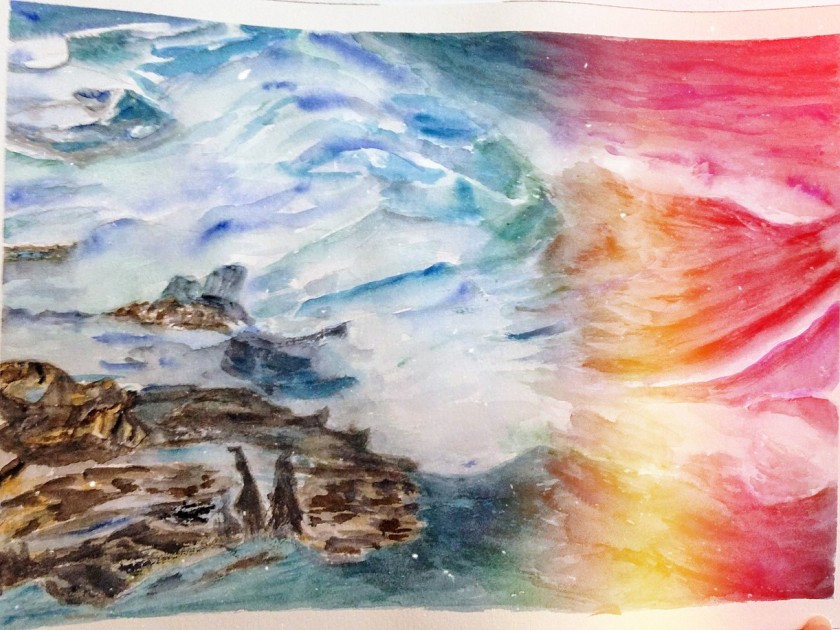
Watercolor by Maritess Sulcer, edited
“I have no interest in womanhood. In any particular dress. In any particular tasks. In any particular voice. I don’t want to be a man either. I want a new form.”
“You could be a bird with me.”
Naamah laughs. “Would I be happy, do you think?”
Where it starts: Genesis is a queer space.
The text of Genesis itself is not often queer, but if you approach Genesis as a writer obsessed with world-building, the rules laid out by Genesis create a queer space.
The rules: people live for centuries, marriages last for centuries; God speaks, God takes different forms (a night spirit, a river spirit, a burning bush, three men speaking together); angels exist, angels speak, there are fallen angels who can impregnate women, there are the children of fallen angels (the Nephilim, the giants). What isn’t possible in an environment like this?
Looking at the marriages themselves, most of the men have their wives, plus concubines or handmaidens (read: slaves). They’re not kind towards women or interested in consent, but these are the kinds of marriages depicted over and over again. In terms of our contemporary understanding of a “typical” and “moral” marriage, these are wildly unusual relationships.
So when I was writing Naamah—my retelling of the story of Noah’s ark from her perspective — knowing all of this about Genesis and understanding the world that Naamah lived in, I knew that presenting her in a contemporary marriage with Noah would be dishonest, to the point of foolishness. And, honestly, it would be uninteresting to me. We have enough depictions of “standard” marriages and how they are stretched and stressed.
I knew that presenting her in a contemporary marriage with Noah would be dishonest, to the point of foolishness.
In writing Naamah, here was a chance to engage with a woman who lived and participated in a partnership for centuries, who raised three sons into their adulthood, who had to resign herself to God’s word, who had to tend to enough of life on Earth such that she might begin it again; all after watching the world she knew be utterly destroyed, so much so that there was no sign of it ever again.
Experiencing something like the rains and the flood, and then participating in the creation of a world, one that’s in fact a near exact recreation of one’s old and beloved world — I imagine that would shake Naamah’s understanding of everything; from her life, to her marriage, her selfhood, her gender, her relationship to her own abilities to create, her value, her worth, her wickedness and her goodness, and indeed the whole idea of wickedness and goodness.
And a person struck down like that, to nothing, and asked to rebuild, that’s the essence of being queer for me. Because my understanding of myself was not presented anywhere, I had to break apart the understandings of people that were presented to me, take them apart, find what fit, and build an identity out of those pieces, and build a community out of the people who had done likewise.
And a person struck down like that, to nothing, and asked to rebuild, that’s the essence of being queer for me.
So yes, I told a queer story when I told Naamah’s story, but it was the only story that made sense for her. It was driven by her character, her world, and the story, as it has been told for millennia. I’d question any biblical retelling that was not queer.
I perhaps made the specifics as queer as I could. Naamah sleeps with a widow for years before the flood. She sleeps with her daughter-in-law on the deck of the ark. She sleeps with an angel who has taken the form of a woman and now lives in the floodwaters. She kisses God. In her dreamscape, she befriends a cockatoo who is endlessly curious about human preconceptions of gender. She questions herself, and she questions the world, and she questions God’s intent and His execution of His plans. She is everything I want in a person.
What I would add: it is difficult to sit down each day and write a novel if it does not feel important to write it. Reclaiming Naamah’s story, finally giving her a voice, being true to her world and her life, letting her be the queer questioning person that I’m sure she would have been — all of it — felt, not just important, but urgent. And I felt that it was an honor to write it. And I’m grateful to everyone who’s read her story.
Sarah Blake is the recipient of a Literature Fellowship from the National Endowment for the Arts. Her writing has appeared in The Kenyon Review, The Threepenny Review, Slice, and elsewhere. She won the 2019 National Jewish Book Award for Debut Fiction.